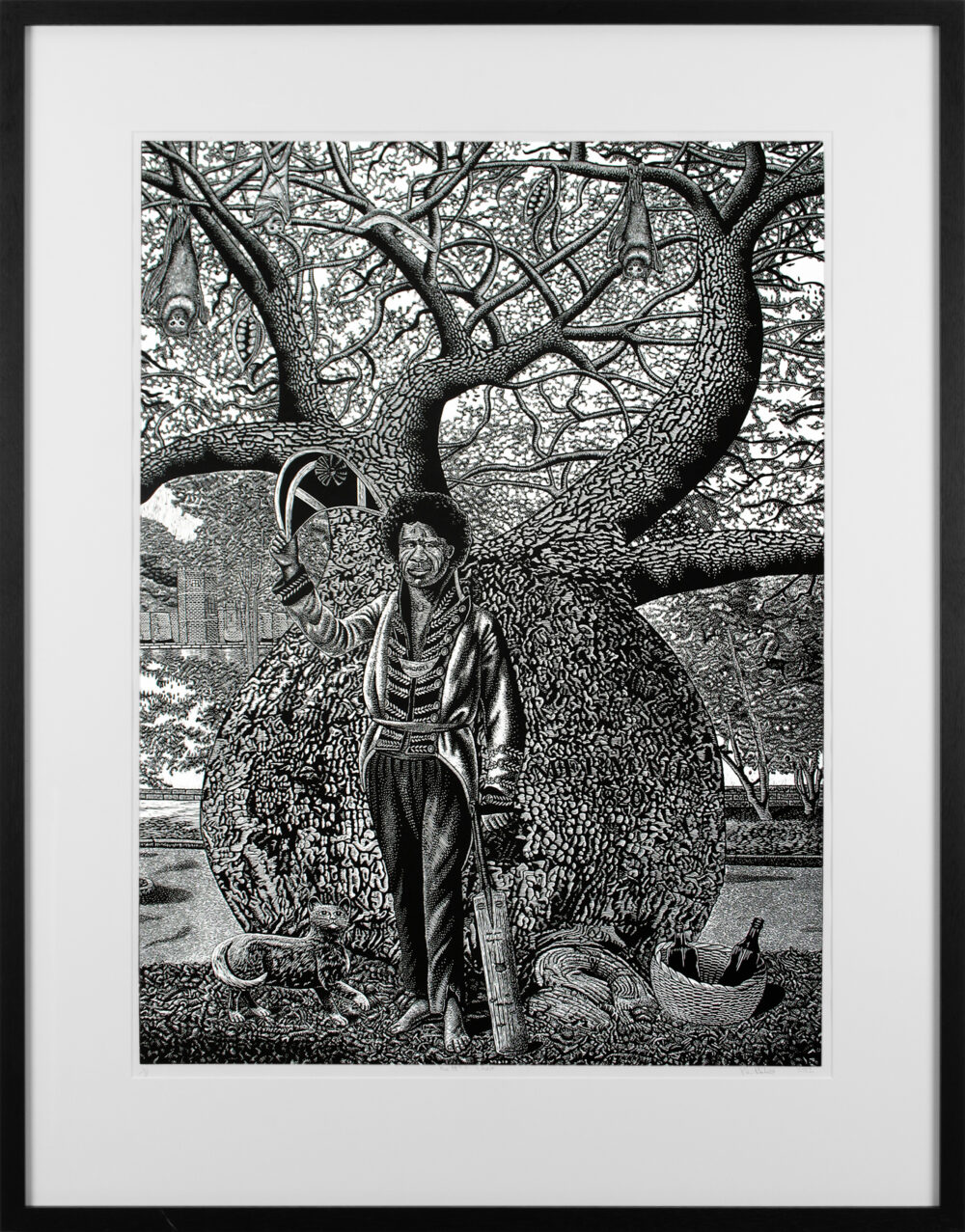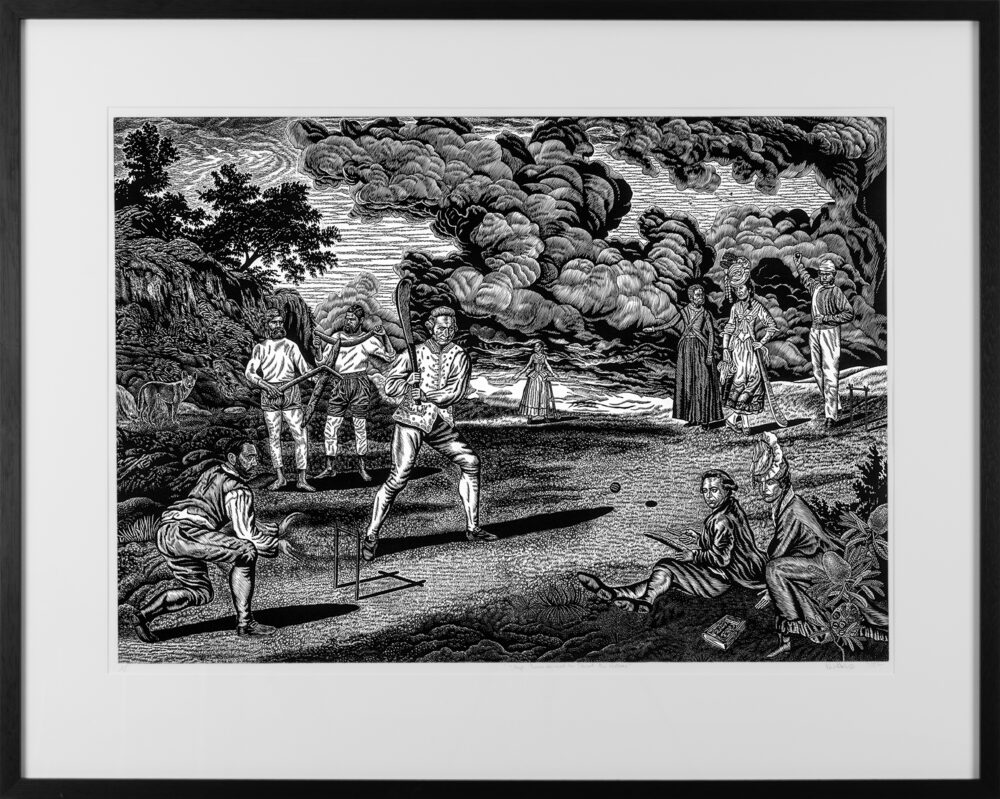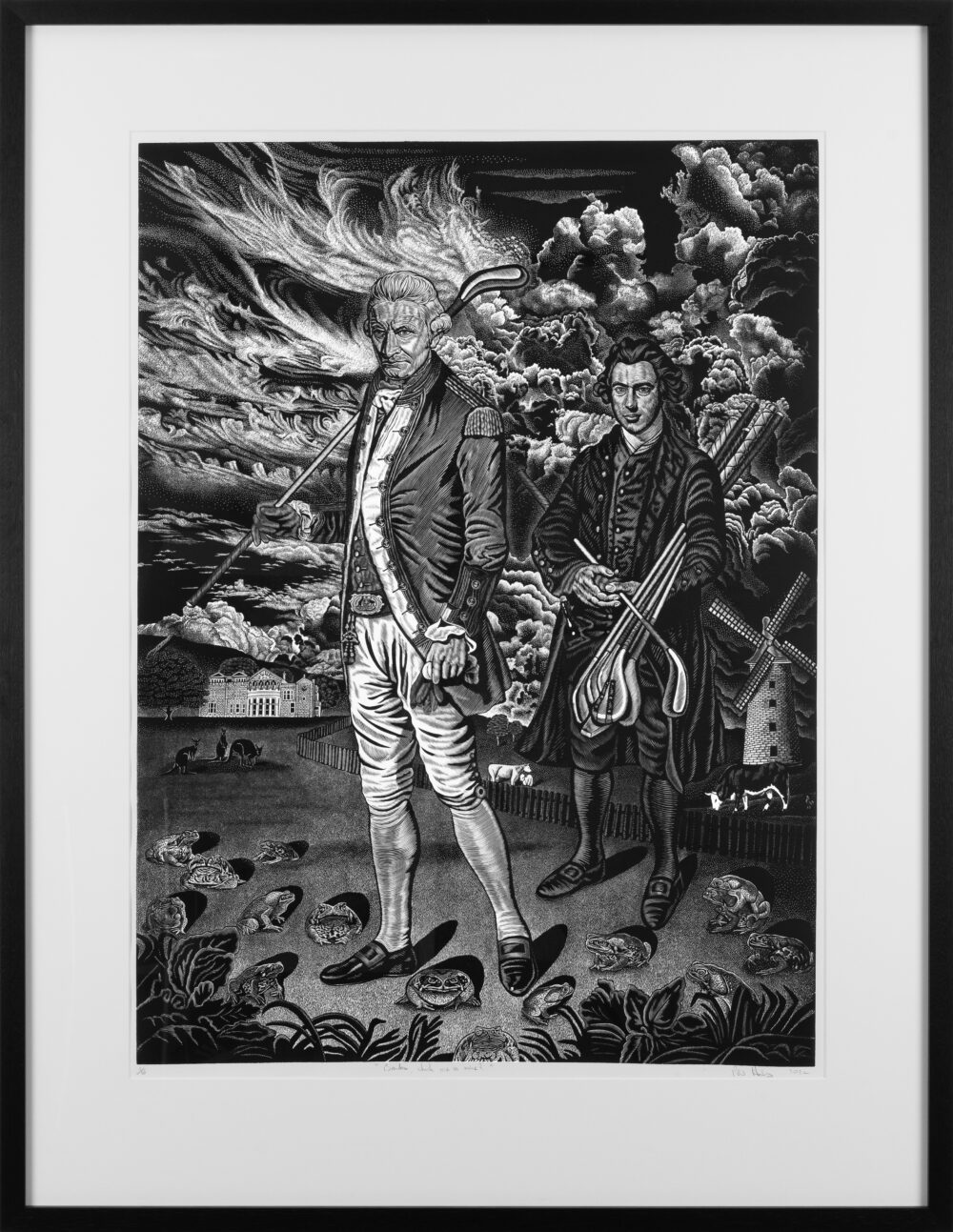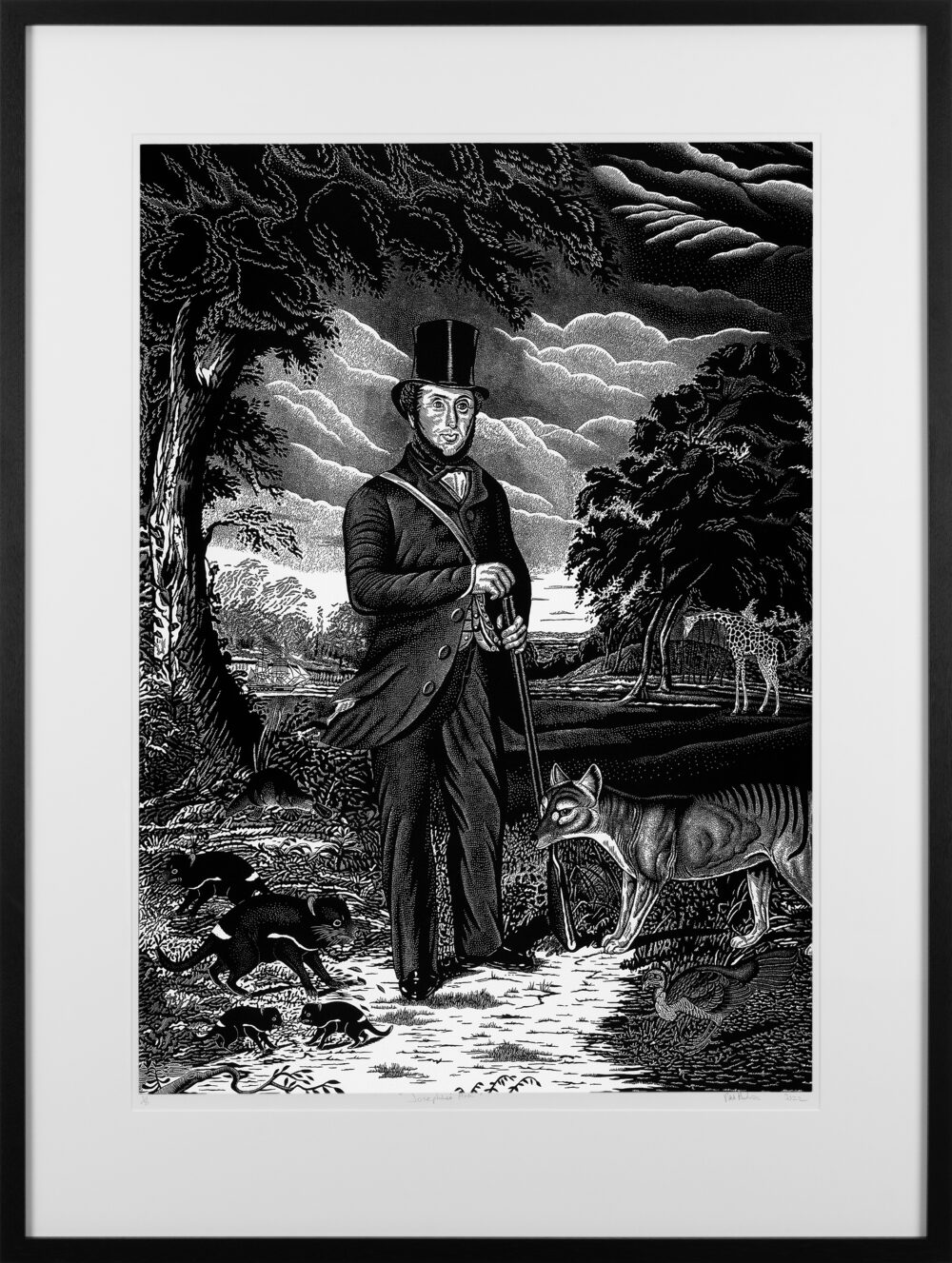
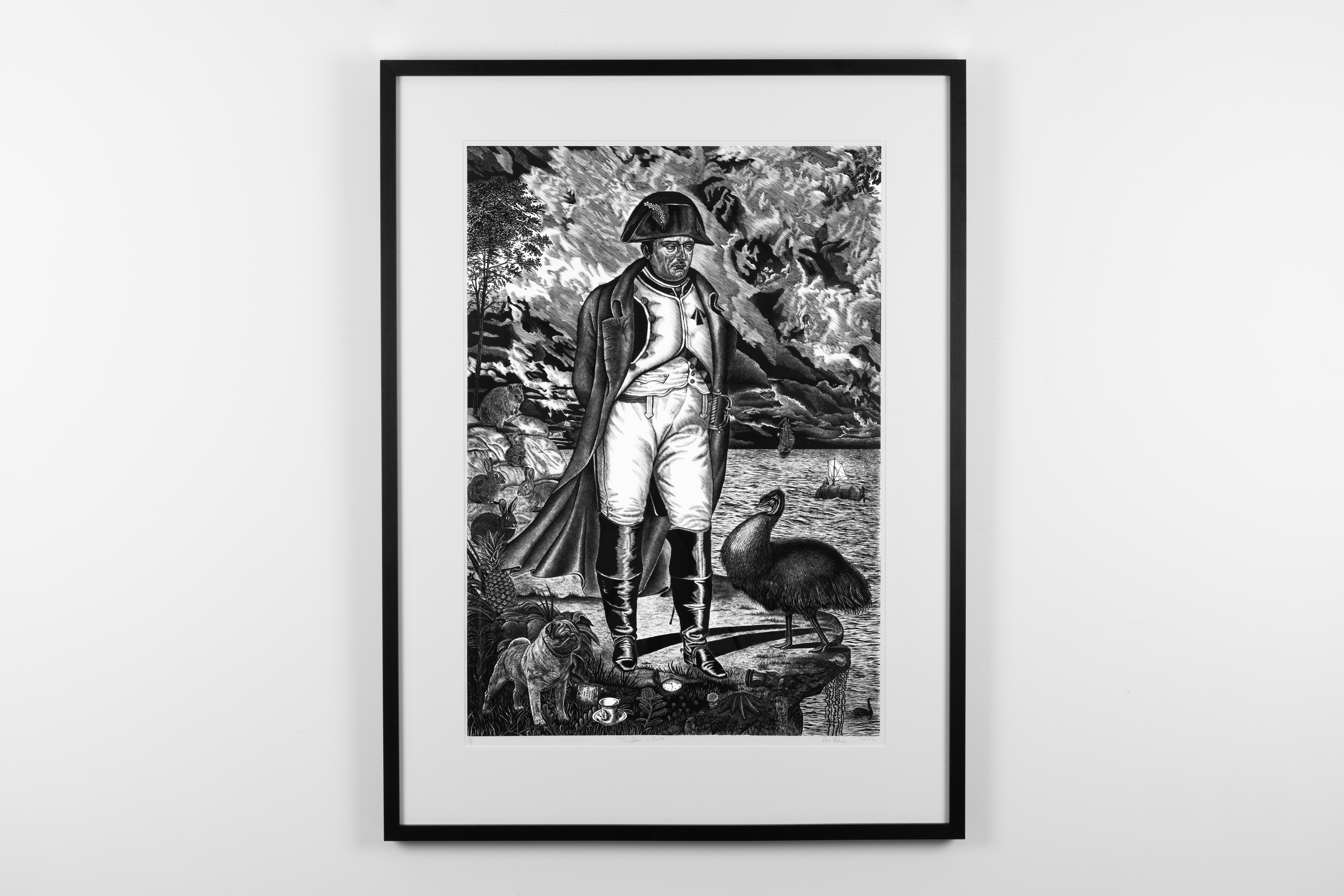
This is a satirical portrayal of Napoleon Bonaparte in exile on a small island off the coast of Western Australia. Napoleon was actually exiled twice. Once on Elba, a Mediterranean island off Tuscany where he escaped within the first year and again after the defeat of the French in the Battle of Waterloo, when he was exiled to St Helena, two thousand kilometres off the west coast of Africa for six long years.
Napoleon is depicted as the fallen French Emperor with a bad case of ‘small man syndrome’ (Napoleon Complex). A fanciful scenario has erupted between Napoleon and the male dwarf King Island emu (now extinct), both sizing each other up with inflated chests over a mate, territory or just ego. Maybe it’s ‘tiny island syndrome’. The major size discrepancy fails to deter this fine-feathered beast. Behind Napoleon, a solitary dwarfed marsupial, the quokka, quietly observes these sparring ‘peacocks’, realising it is better left to the big guns.
Littered in the foreground is evidence of the preferential treatment Napoleon was continually given. He received a steady supply of quality coffee, followed by his customised mandarin cognac consumed over a game of chess that he approached like an obsessive military strategist.
The colony of rabbits reminds Napoleon of one of the few times he retreated from a battle after signing the Treaties of Tilsit at the end of the war with Russia. A celebratory rabbit hunt was organised using hundreds of domestic rabbits, and as Napoleon alighted from the coach, the rabbits mistook him as their keeper and charged at him expecting to be fed. They ran up his trousers and into his coat, nipping at anything as they went. Completely outnumbered, he retreated back into the coach, discarding these ravenous little creatures out of the window as the coach sped away. A defiant pug named Fortune was Josephine’s constant companion. Apparently, Napoleon tried to banish Fortune from the marital bed on the wedding night, but Josephine refused to sleep with him unless Fortune was welcomed into their bed.
The Nautilus (an 1800 submarine) can be seen partially submerged in the waters, just out of Napoleon’s view. Once considered by him as a possible addition to his navy, here it may be planning to evacuate him from this isolated hell hole.
Bonaparte was not to escape from this final exile and died a painful death caused by stomach cancer – or was it arsenic poisoning? On his deathbed, he repeatedly begged for a final sip of coffee and which he exclaimed was the only good thing about Saint Helena. He also declared his eternal love for France and Josephine. He died aged 51 in 1821.
-Rew Hanks
Napoleon in Exile, 2011
Price range: $2,000 through $2,900
This is a satirical portrayal of Napoleon Bonaparte in exile on a small island off the coast of Western Australia. Napoleon was actually exiled twice. Once on Elba, a Mediterranean island off Tuscany where he escaped within the first year and again after the defeat of the French in the Battle of Waterloo, when he was exiled to St Helena, two thousand kilometres off the west coast of Africa for six long years.
Napoleon is depicted as the fallen French Emperor with a bad case of ‘small man syndrome’ (Napoleon Complex). A fanciful scenario has erupted between Napoleon and the male dwarf King Island emu (now extinct), both sizing each other up with inflated chests over a mate, territory or just ego. Maybe it’s ‘tiny island syndrome’. The major size discrepancy fails to deter this fine-feathered beast. Behind Napoleon, a solitary dwarfed marsupial, the quokka, quietly observes these sparring ‘peacocks’, realising it is better left to the big guns.
Littered in the foreground is evidence of the preferential treatment Napoleon was continually given. He received a steady supply of quality coffee, followed by his customised mandarin cognac consumed over a game of chess that he approached like an obsessive military strategist.
The colony of rabbits reminds Napoleon of one of the few times he retreated from a battle after signing the Treaties of Tilsit at the end of the war with Russia. A celebratory rabbit hunt was organised using hundreds of domestic rabbits, and as Napoleon alighted from the coach, the rabbits mistook him as their keeper and charged at him expecting to be fed. They ran up his trousers and into his coat, nipping at anything as they went. Completely outnumbered, he retreated back into the coach, discarding these ravenous little creatures out of the window as the coach sped away. A defiant pug named Fortune was Josephine’s constant companion. Apparently, Napoleon tried to banish Fortune from the marital bed on the wedding night, but Josephine refused to sleep with him unless Fortune was welcomed into their bed.
The Nautilus (an 1800 submarine) can be seen partially submerged in the waters, just out of Napoleon’s view. Once considered by him as a possible addition to his navy, here it may be planning to evacuate him from this isolated hell hole.
Bonaparte was not to escape from this final exile and died a painful death caused by stomach cancer – or was it arsenic poisoning? On his deathbed, he repeatedly begged for a final sip of coffee and which he exclaimed was the only good thing about Saint Helena. He also declared his eternal love for France and Josephine. He died aged 51 in 1821.
-Rew Hanks









